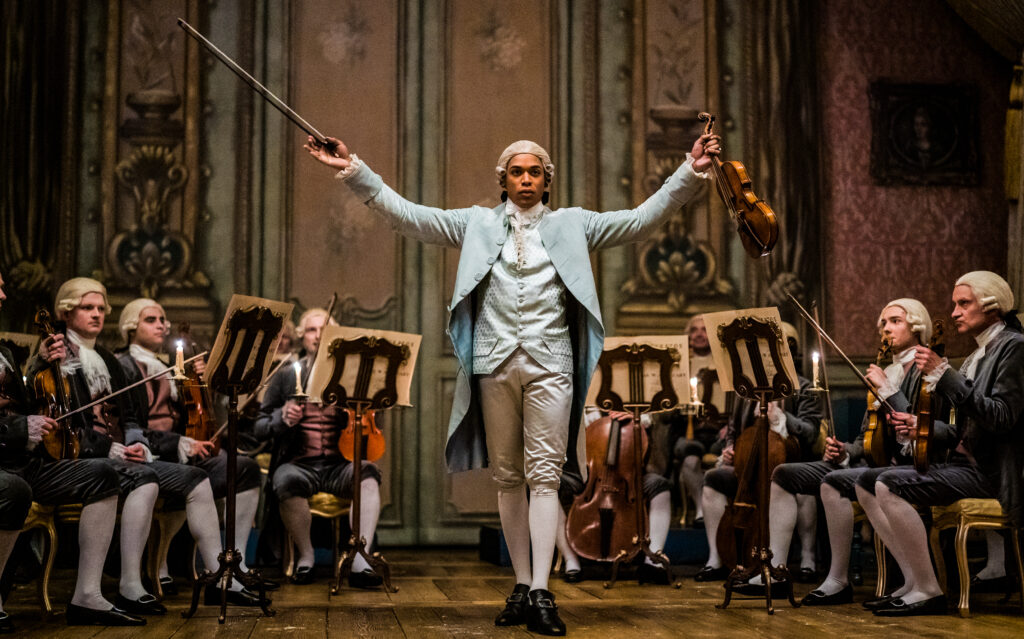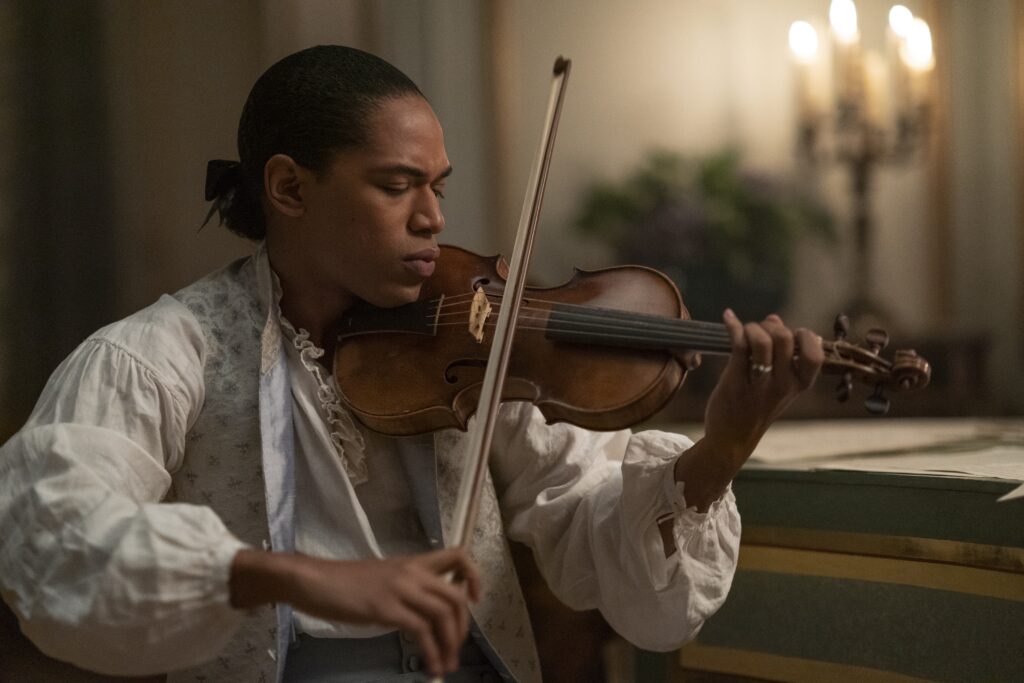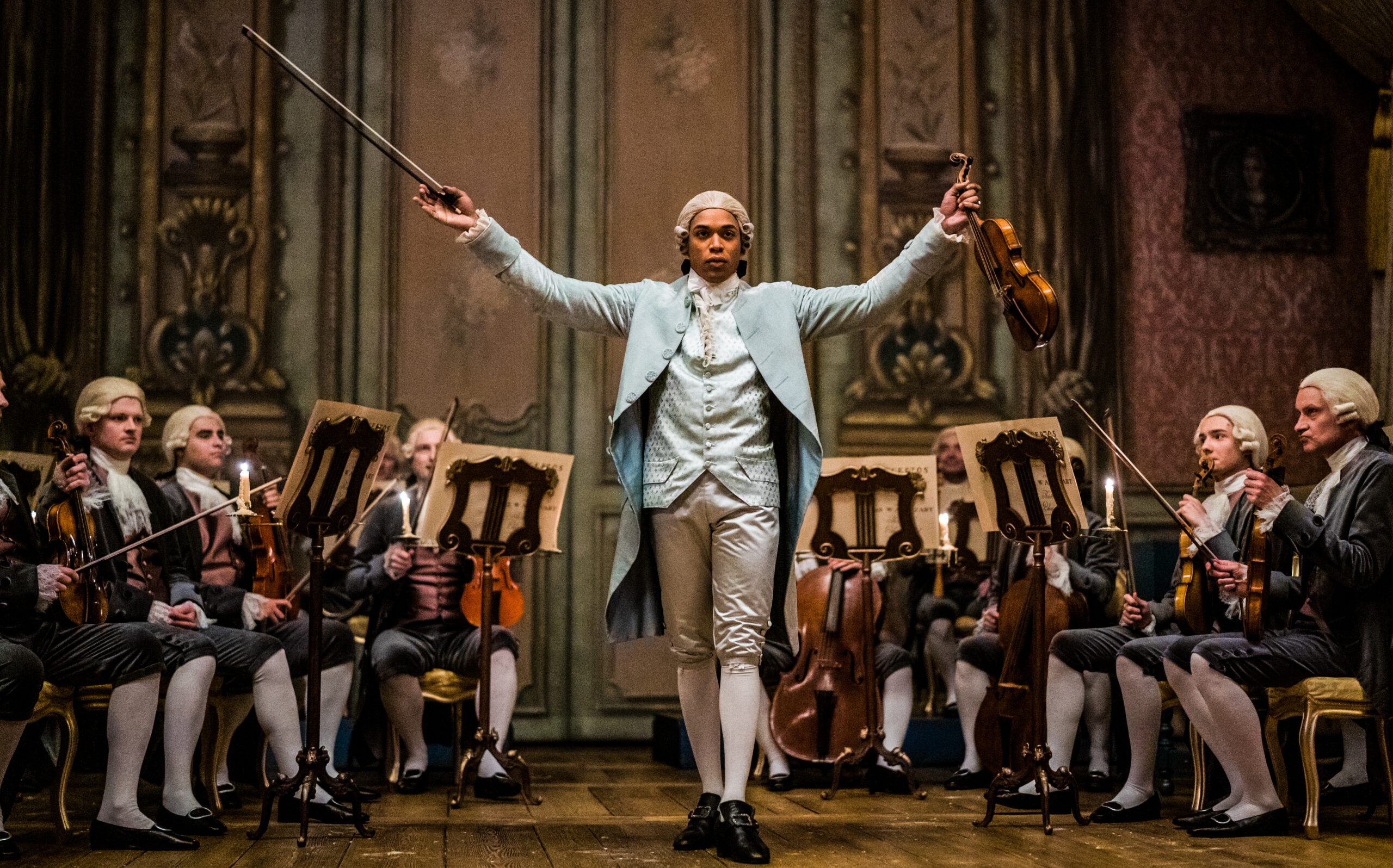Black people have made tremendous accomplishments in music, but racial barriers and stereotypes remain when it comes to recognition of Black artists. Classical music is a genre that historically has not elevated many Black people as influential figures, based on who gets to lead the world’s major classical orchestras and conservatories.
The biopic “Chevalier”, released by Searchlight Pictures on April 21, follows the life of musician/fencer Joseph Bologne, also known as Chevalier de Saint-Georges. Bologne was the first Black artist to lead a major orchestra in France. Bologne, who lived from 1745 to 1799, was born in Guadeloupe in the Caribbean. His mother, Nanon, was an enslaved Black woman originally from Senegal. His father was a wealthy white plantation owner named Georges de Bologne Saint-Georges.

As depicted in “Chevalier,” Bologne was 7 when his father sent him to France, where he attended school and lived the rest of his life. Bologne grew up to become a masterful violinist, a skilled composer, and champion fencer, but he experienced brutal racism along the way. And when he became more involved in civil rights causes for the French Revolution, he risked destroying powerful alliances that he made with members of high society, such as French Queen Marie Antoinette.
In “Chevalier,” Kelvin Harrison Jr. plays Joseph as a teen and as an adult. Ronkẹ Adékoluẹjo portrays Joseph’s mother, Nanon. The movie also has several Black people in key roles on the creative team, including director Stephen Williams, writer/producer Stefani Robinson, producer Zahra Phillips, casting director Kharmel Cochrane, music composer Kris Bowers, and music producer/arranger Michael Abels.
Audiences will notice that although “Chevalier” is set in 1700s France, many of the same racial issues depicted in it remain today for Black people in classical music all over the world. Ask anyone to name five famous Black people in classical music, and you’d be lucky if you can get someone to name two. And the list gets even shorter if it’s about Black people who are still alive. There’s also the problem of misogynoir, because it’s still extremely rare for a Black woman to make it to the top of the classical music hierarchy.

Classic FM compiled a list of the greatest Black classical music conductors/composers in history. Those who made the list and are deceased include Joseph Bologne; Samuel Coleridge-Taylor (1875 – 1912); James DePreist (1936 – 2013); Dean Dixon (1915 – 1976); Rudolph Dunbar (1907 – 1999); Calvin E. Simmons (1950 – 1982); and William Grant Still (1895 – 1978). Those on the list who are still alive (as of this writing) are Kevin John Edusei, Anne Lundy, Jeri Lynne Johnson, Wayne Marshall, Kwamé Ryan, and Thomas Wilkins.
What about the next generation of Black conductors and composers? Statistics show that the percentage of Black classical conductors remains low, and the numbers have been decreasing. The career website Zippia published statistics from 2010 to 2021 for classical music conductors of major orchestras. According to the data, Black/African American people represented only 5.6% of these conductors in 2021. Furthermore, Black Americans were the only racial group where the percentages of conductors is on a downward trajectory — dropping from 8.4% in 2020 to 5.6% in 2021.
What does this mean for the future of Black representation in classical music?
“When it comes to all of the arts, classical music is probably the furthest behind,” says Kori Coleman, founder of D-Composed, a Chicago-based activist collective of Black people in classical music.
Coleman founded D-Composed in 2017 as a way to showcase and promote Black people in classical music. D-Composed presents performances of all-Black music orchestras and all-Black chamber groups; offers career assistance to Black people in classical music; and hosts events related to Black people in classical music. For example, D-Composed hosted an advance screening of “Chevalier” in Chicago. Members of D-Composed performed before the movie started.
Coleman comments on recent changes for Black people in classical music: “What we’ve seen, as a result of what I like to call ‘the reckoning of 2020 with George Floyd,’ is that [major orchestras] have started programming more works of Black composers. It’s great that they’re programming, but it’s kind of like they’re checking boxes.”
Coleman says real change comes from sustained employment and room for advancement for Black composers, not just a temporary featured spot.
As for the decline in the number of Black classical conductors in recent years, Coleman has this theory: “I think there’s also a decline in general of people in concert halls to witness these pieces. We need to be in [the Black] community, and not just expect for people to be in the concert hall. … I think Black people are being more conscious about … not being exploited in the process.”
The barriers to entry in classical music often come down to race and socioeconomic circumstances. A child who attends a school where classical music is taught, or lives in an area where classical music is regularly performed, is more likely to get the crucial early exposure that inspires people to pursue careers in classical music. Unfortunately, many music education programs have been cut from schools, especially public schools, thereby decreasing many students’ chances of learning about classical music.
Even when Black people have easy access to classical music, Black people might be discouraged from pursuing careers in classical music because they are told by people around them that classical music is music for white people. However, Coleman thinks the bigger problem is that there aren’t enough Black people who are given the chance to be role models and mentors in classical music.
Coleman says, “To quote Marian Wright Edelman: ‘You can’t be what you can’t see.’ I think the reason why so many Black children don’t think of classical music is because they aren’t seeing themselves. … They aren’t seeing anything that represents their identity.”
Coleman adds, “That’s why we [at D-Composed] still do school performances, because we know how important it is for us to be that example. What I love about our audience is we’re a lot of people’s first time not only being exposed to classical music but also exposed to the music of Black composers. … It gives people the confidence to enter the space.”
Through her work with D-Composed, Coleman says she’s encouraged to see that Black people in classical music, especially those from younger generations, are more open to getting their music out to the public in ways that don’t necessarily involve the traditional path of joining an orchestra. For example, today’s classical musicians have options that weren’t available before modern technology existed. People can go on the Internet to release their music independently and do direct marketing and selling without having to wait to get a deal with a major record company.
Artists can do livestreams or post other performance videos of themselves to help get concert bookings, although a booking agent is still usually required for gigs at major events. And more Black hip-hop artists are starting to incorporate classical orchestras into their music, which helps bridge the gap between people who are classical music fans and people who might not otherwise listen to classical music. “There are ways to do this while honoring your culture and who you are as a person,” says Coleman.
Coleman hopes that “Chevalier” can bring more awareness of Black people’s influence in classical music.
“What I really appreciated about the movie is how they shared the different levels of what Black people experience being in classical music,” Coleman says. “While a lot of it is dramatized for the movie, I thought it reflected a lot of conversations I’ve had with [Black] musicians and composers. It’s feeling like you have to be a certain way, in order to fit in this space.”
Coleman adds, “In classical music, you have a field that is so rooted in perfectionism and being great. On top of being Black, you already have everyone looking at you, so there’s no way you can mess up or shake the table too much if you want to be accepted in this world. I loved that [‘Chevalier’] touched on topics like that. … Ultimately, what I’m excited about for this movie is that I hope it opens the door and pathways to have more conversations about Black composers, Black musicians, Black classical music.”
Coleman concludes, “So many people still don’t know about Black composers. I hope more stories are going to be told as a result of [‘Chevalier’], because we’re just now starting to get more recognition – but there’s still more work to be done.”








